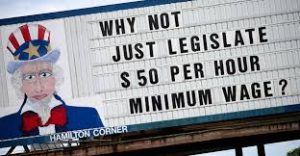Seattle is going through a “grand experiment” on whether raising the minimum wage to a “living wage” will actually increase the take home pay of workers. Why should we care in Colorado? This year marks the beginning of a similar “grand experiment” here in Colorado. With the passage of Amendment 70, effective January 1, 2017, Colorado’s minimum wage is increased to $9.30 per hour and is increased annually by $0.90 each January 1 until it reaches $12 per hour effective January 2020 (Colorado.gov). How will this impact the Colorado economy?
The reason I emphasize “grand experiment” is because there have not been large increases in the minimum wage like the ones being implemented in Seattle, California, and Colorado and therefore the true impact is very debatable with hundreds of studies on both sides of the argument. One camp professes that increasing the minimum wage will increase the take home pay of employees and therefore lead to more spending, etc…. On the other side of the argument, economists feel that increased wages will have negligible impact because businesses will adapt and cut back hours, hire fewer employees, use technology to replace workers, etc…
Can both groups of economists be correct? Even though I’m a finance guy and like answers to be a clear yes or no, in this case Seattle proves that neither economic camp is totally correct all the time. Seattle’s minimum living wage increase is set to go in steps like Colorado. This “step” function has provided interesting economic modeling and helped determine when each economic theory is correct.
In Seattle, as wages increased from $9.47 to $11/ hour, the effects on earnings were pretty small, on average employees received about $288 more per year while at the same time employment declined slightly. Basically, the first increase in the minimum wage ended up a draw for economists with no clear winner since wages increased a little and employment fell a little basically canceling each other out.
A new study (same parameters used as in the first one mentioned above) just released by the University of Washington (contracted by the city of Seattle) has livened the debate about minimum wage. In their recent study, they found that as the minimum wage increased from 11 to 13/hour workers lost about 1500/year; this amounted to a $100 million a year loss in payroll. (source: UW.edu) How is this possible? This study found huge effects: For every 1 percent increase in their hourly wage, low-wage workers saw a 3 percent reduction in the number of hours worked. (source Bloomberg).
What this study tells us is that there was a “tipping point” for businesses on their ability to absorb large labor cost increases. Increasing the min wage small amounts have little impacts on businesses and employees, but once this tipping point was crossed businesses adapted by increasing efficiency or reducing service. Both resulted in less labor employment. This trend will likely accelerate as wages increase again to $15 dollars per hour as businesses will not be able to absorb or pass on the large increase to consumers.
This study was not what voters of increased minimum living wage had hoped for. With the new information coming out of Seattle what does this mean for Colorado with our min wage on track to increase drastically over the next three years?
In 2016, Colorado’s minimum wage was $8.31 and is set to increase to $12 by 2020. This amounts to a 44% increase. What the University of Washington study showed is that the increase in the minimum wage in Seattle exceeded the “tipping point” and therefore the impact of the minimum wage was detrimental to workers. Seattle increased their minimum wage by 37% (9.47 to 13 for the study) which exceeded the tipping point for businesses.
Colorado’s 44% increase in min wage will no doubt increase wages well beyond the tipping point where they are able to absorb the cost (or pass on to consumers) and therefore, similar to Seattle, low wage workers will see a net decrease in pay as hours are cut.
The increase in Colorado’s min wage will ultimately decrease the take home pay of low wage workers. This decrease in pay will transfer into a deepening of the housing crisis plaguing large parts of the state as workers have less income to spend on housing.
The original intent of a minimum wage increase in Colorado was to ensure base workers were paid a fair living wage. The recent study of Seattle’s “grand experiment” shows that there are economic byproducts of large increases in pay. The large pay increases promised at the ballot box ironically are morphing into pay decreases for the large majority of workers as hours are cut and employees are eliminated. Colorado’s “Grand Experiment” will no doubt turn out not so grand to workers paychecks.
Resources
- https://www.bloomberg.com/view/articles/2017-06-26/seattle-s-painful-lesson-on-the-road-to-a-15-minimum-wage
- http://www.denverpost.com/2017/06/26/study-seattle-minimum-wage-costs-jobs/
- http://www.takepart.com/article/2016/06/02/fight-for-15-cant-solve-americas-rent-crisis
- https://www.colorado.gov/pacific/cdle/minimumwage
- http://www.11alive.com/money/2017-minimum-wage-increases-these-states-are-paying-workers-more/380761154
- https://evans.uw.edu/policy-impact/minimum-wage-study
- https://evans.uw.edu/sites/default/files/two%20page%20overview.pdf
- https://www.washingtonpost.com/news/wonk/wp/2017/06/27/maine-tried-to-raise-its-minimum-wage-restaurant-workers-didnt-want-it/?utm_term=.6161cdee10ee
- http://www.cobizmag.com/Trends/How-will-Seattles-grand-living-wage-experiment-impact-Colorado/
Written by Glen Weinberg, COO/ VP Fairview Commercial Lending. Glen has been published as an expert in hard money lending, real estate valuation, financing, and various other real estate topics in the Colorado Real Estate Journal, the CO Biz Magazine, The Denver Post, The Scotsman mortgage broker guide, Mortgage Professional America and various other national publications.
Fairview is the recognized leader in Colorado Hard Money and Colorado private lending focusing on residential investment properties and commercial properties both in Denver and throughout the state. We are the Colorado experts having closed thousands of loans throughout the state.
When you call you will speak directly to the decision makers and get an honest answer quickly. They are recognized in the industry as the leader in hard money lending with no upfront fees or any other games. Learn more about Hard Money Lending through our free Hard Money Guide. To get started on a loan all they need is their simple one page application (no upfront fees or other games)
